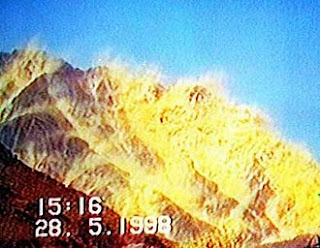1939 the project to develop nuclear bombs, the "Manhattan Project," led by the US, supported by the UK and Canada (but not informing the other Ally Russia), taking place at 30 sites over the three countries, while gathering information on the German nuclear project and gathering German nuclear materials and scientists (and many other European exiles). The main priority was to produce fission-based explosives before Germany. It was the largest industrial enterprise ever at the time.
1945 July 16 America detonated a bomb code-named "Trinity". Truman, receiving news of the success, briefed Churchill and informed Stalin that America was in possession of a "powerful new weapon," which was no surprise to Stalin, who had spies in the Manhattan Project. July 26 an ultimatum was issued that Japan surrender or face "complete and utter destruction." 1945 Aug. 6 Truman gave permission for the world's first use of an atomic weapon on Hiroshima and on the 9th Nagasaki. After Hiroshima, Truman announced,
"We are now prepared to obliterate more rapidly and completely every productive enterprise the Japanese have above ground in any city. We shall destroy their docks, their factories, and their communications. Let there be no mistake; we shall completely destroy Japan's power to make war. It was to spare the Japanese people from utter destruction that the ultimatum of July 26 was issued at Potsdam. Their leaders promptly rejected that ultimatum. If they do not now accept our terms they may expect a rain of ruin from the air, the like of which has never been seen on this earth ..."
Aug. 9 Early morning word reached Tokyo that the Neutrality Pact with the USSR was over, as Moscow declared war on Japan and invaded Manchuria. Before noon Tokyo received word that Nagasaki had been bombed. After a day of debate over the terms of surrender, after midnight that night the Emperor is remembered to have stated,
"I have given serious thought to the situation prevailing at home and abroad and have concluded that continuing the war can only mean destruction for the nation and prolongation of bloodshed and cruelty in the world. I cannot bear to see my innocent people suffer any longer. ..."
It goes without saying that it is unbearable for me to see the brave and loyal fighting men of Japan disarmed. It is equally unbearable that others who have rendered me devoted service should now be punished as instigators of the war. Nevertheless, the time has come to bear the unbearable. ...
I swallow my tears and give my sanction to the proposal to accept the Allied proclamation on the basis outlined by the Foreign Minister."
The Privy Council Secretary was remembered to have asked, "Your majesty, you also bear responsibility for this defeat. What apology are you going to make to the heroic spirits of the imperial founder of your house and your other imperial ancestors?"
Aug 10 early the Foreign Ministry sent telegrams by way of the Swiss Federal Political Department announcing the acceptance of the Potsdam conditions of surrender, reserving only the prestige and rights of the Emperor. After more conventional bombing flights over Japan, the Emperor and his cabinet transmitted to their embassies in Switzerland and Sweden their notice of surrender on Allied terms
1946 Congress established the American Energy Commission and transferred control of nuclear projects from the military.
1949 Aug. 29 USSR detonated a bomb, the "Joe-1". Volunteer spies in the Manhattan Project had been informing Moscow of the progress of that project. The Russians put their full efforts into their own atomic project. America had monopolized the best uranium reserves (in Belgian Congo). The first Soviet test surprised America, who predicted the Soviets would realize their bomb years later. The test was reported to the world by Truman, when the Americans detected the fallout in Kazakhstan with the test-detection system they had secretly built on their WB-29 Superfortress. The arms race and domestic persecution of political enemies increased and in 1950 Truman announced a speedy program to design a more powerful bomb, the hydrogen bomb (tested Nov. 1952, announced Jan. 1953, matched by the Soviet's Aug. 1953). 1951 China agreed to supply the USSR with uranium in exchange for nuclear technology (an agreement which faltered when the two countries started to fall out after Stalin's death).
1950 Apr. 10 Britain detonated a bomb.
1960 Feb. 13 France detonated a bomb, Berboise Bleue, in the middle of the Algerian Sahara Desert.
1964 Oct. 16 China detonated a bomb.
1967 (or thereby) Israel is believed to have possessed nuclear capability.
1974 May 18 India detonated a bomb.
1979 (possibly that date) South Africa detonated a bomb.
1998 May 28 Pakistan detonated a bomb.
2006 Oct. 9 North Korea detonated a bomb.










.jpg)




No comments:
Post a Comment